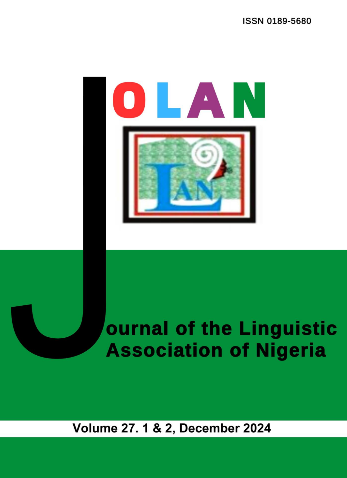Conditional Sentences in Ekid
Abstract
This paper examines conditional sentences with the conditional conjunction if in Ekᴉd, with a view to determining their syntactic formation and internal structure, including their semantic roles. The descriptive research design was adopted for the study, and data were collected through elicitation from four competent native speakers of Ekᴉd between the ages of 50 and 65, who have resided in Ekᴉd for over 40 years. GB (Government and binding) Syntax was deployed in the analysis of data. Investigation reveals that in Ekᴉd, conditional sentences with the conditional conjunction – if are therefore classified into various classes: zero conditionals (real), first conditional (predictive), second conditional (unreal) and third conditional (hypothetical). The conditional conjunction – if in Ekᴉd conditional sentences has played a vital linguistic role in terms of its position in the conditional sentence; it occurred morphologically as one-wordàdíékè/ákpédè‘if’ and as a conditional modal affix kpé- ‘if’. Also, this work reveals the relationship between the conditional conjunctionsàdíékè/ákpédè ‘if’and the conditional modal affix kpé- ‘if’ in Ekᴉd conditional sentences, which is determined by the tense of the conditional sentence.
References
Abbas, A. M. 2012. Conditional Sentences in English and Kurdish: A Contrastive Study. Al-Fatih Journal, 50.
Adiakpan, J. B. 2000. The Eket Speaking People. Lagos: Okojohn Nigeria Limited.
Bennett, J. P. 2003. A philosophical guide to conditionals. Oxford: Clarondon Press.
Bhatt, R., and Pancheva, R. 2007. Conditional. The Blackwell, Companion to Syntax 638-687.
Crystal, D. 1997. The Cambridge Encyclopedia of Language, 2nd ed., Cambridge: Cambridge University Press.
Dancygier, B. 1998. Conditionals and Prediction: Time, Knowledge, and Causation in Conditional Constructions, volume 87. Cambridge: Cambridge University Press.
Essien, O. E. 1990. A Grammar of the Ibibo Language. Ibadan: University Press Limited.
Haegeman, L. 1994. Introduction to Government and BindingTheory. 2nd Edition. Oxford Blackwell; Blackwell Publishers.
Kaufmann, S. 2001. Aspects of the Meaning and Use of Conditionals. (Unpublished Ph.D. dissertation). University of Standford.
Quirk, Bandolph, Greenbaum, Sidney, Leech, Geoffrey and Svartvik, 1985. A Comprehensive Grammar of the English Language. London: Longman.
Tynan, J. And Lavin, E. 1997. Mood, Tense and the Interpretation of Conditionals. On Conditionals Again, Duisburg, John Benjamin;s Publishing Company.
Williamson, K and Blench, R. 2000). Niger-Congo. African Languages: An Introduction. B. Heine and N, Derek (Eds.) Cambridge, Cambridge University Press. Pp11-12.
Zhang, B. 2005. The Study of the Acquisition of English If-conditional Sentences by Chinese Learners. MA Thesis. PLA University.














